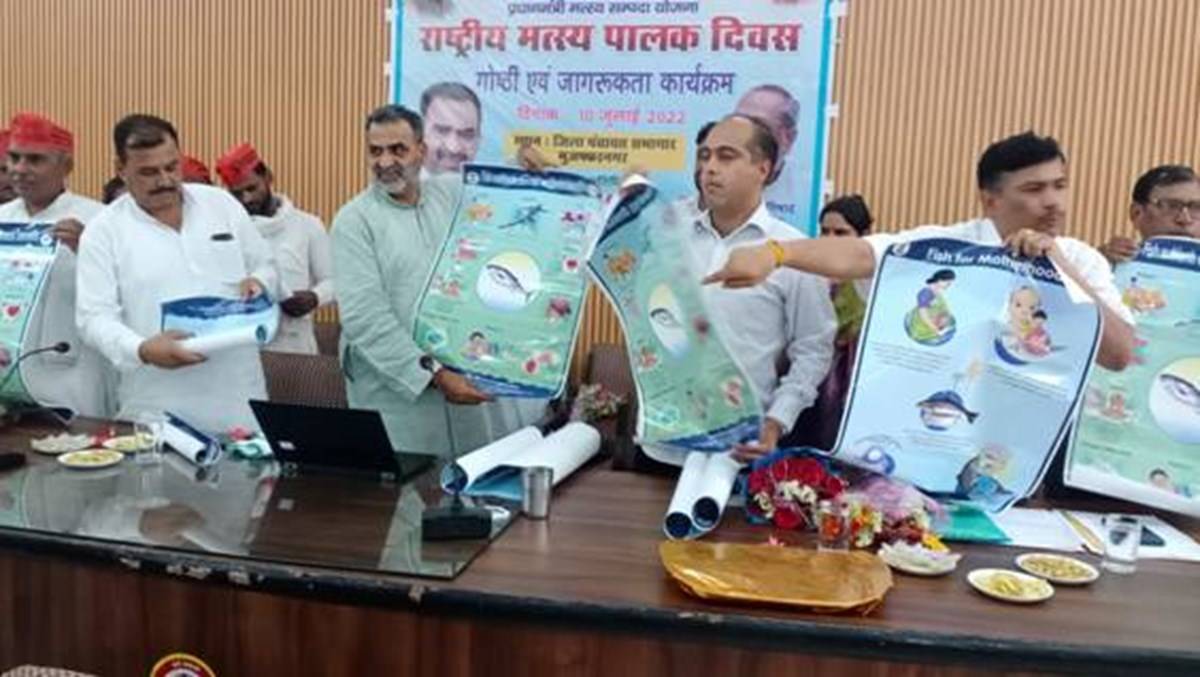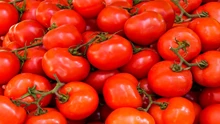
National Fisheries Development Board, Union Ministry of Fisheries, Animal Husbandry, and Dairy, celebrated the 22nd National Fish Farmers Day today at NFDB Hyderabad in a hybrid mode. Dr. Sanjeev Kumar Balyan, Union Minister of State for Fisheries, Animal Husbandry, and Dairying, and Dr. L. Murugan, Union Minister of State for Fisheries, Animal Husbandry, and Dairying, were both in attendance.
The event drew over 1000 fish farmers, aquapreneurs and fishermen, professionals, officials, and scientists from across the country. During the event, four posters promoting domestic fish consumption and sustainable production were distributed. Dr. Sanjeev Kumar Balyan released posters on "Fish for Motherhood" and "Fish Nutrients and their Wellness Benefits," as well as posters on "Sustainable Fishing Practices" and "State Fishes of India" were released by Dr.L. Murugan.
Dr. L. Murugan, who spoke at the event, stated that the country ranks second in fish production through aquaculture. This is due to the scientists' contributions in the development of breeding technologies for various fish species and the culture of improved fish varieties. He also stated that the Prime Minister is encouraging locals to be vocal.
Due to various measures implemented by the government, the country's fisheries exports were unaffected even during the Covid pandemic. According to him, the country has a large untapped fisheries potential. Recognizing the potential of the fisheries sector, the government established the PMMSY, FIDF, and KCC for the benefit of the country's fishers and fish farmers. To encourage seaweed cultivation, the Government of India established a Seaweed Park in Tamil Nadu, as well as fishing harbours are being modernized across the country, the Minister highlighted.
In his address, Dr. Sanjeev Kumar Balyan stated that the government is implementing the flagship scheme of PMMSY for the benefit of fishers and fish farmers in the country with a total outlay of Rs.20050 crore. Farmers, he said, should take advantage of the scheme to boost fish production and productivity while also improving their socioeconomic standing. There is a need to raise consumer awareness of the health benefits of fish, and the NFDB has created some nice posters on the subject.
Jatindra Nath Swain, Secretary of Fisheries, launched the NFDB Lab project on "Assessment of pathogenic microorganisms in fish and aqua feeds, as well as nutrient and residual contaminant profiling." On this occasion, the NFDB and the State Bank of India signed an agreement to facilitate the FIDF and Entrepreneur Models schemes.
Sagar Mehra, Joint Secretary (Inland Fisheries), stated that the country's GDP share of fisheries is steadily increasing. In the country, fisheries support approximately 2.8 crore people. During the programme, dignitaries interacted with progressive fish farmers participating in the PMMSY scheme. Fish farmers who obtained high-quality seed from the NFFBB provided feedback on the growth performance of improved seed varieties. North East fish farmers discussed their prospects in the fishing industry.
This annual event is held to honour Professor Dr. Hiralal Chaudhury and his colleague Dr. Alikunhi for their contributions in achieving the successful induced breeding of major carps for the first time in the country on July 10, 1957, at Angul in Odisha through the administration of carp pituitary hormone extract in the breeding of major carps. Later, the technology was standardized and fine-tuned by developing synthetic hormones for high-quality seed production throughout the country. Over the years, this pioneering work in induced breeding has transformed the aquaculture sector's growth from traditional to intensive aquaculture practices, resulting in the success of the modern aquaculture industry.
The Government of India is at the forefront of transforming the fisheries sector and bringing about an economic revolution in the country through the Blue Revolution. The sector aimed to boost farmers' income by increasing production and productivity, improving quality, and reducing waste.
Taking into account the Centrally Sponsored Scheme "Blue Revolution" - Integrated Development and Management of Fisheries, which was launched in 2016, the Prime Minister launched the "Pradhan Mantri Matsya Sampada Yojana (PMMSY)" with a budget of over Rs. 20,050 crores for a five-year period in 2020.
PMMSY aims to increase fish production to 22 MMT by 2024-25, up from the current 13.76 MMT, and to employ an additional 55 lakh people through this sector. Furthermore, the scheme emphasizes the incorporation of new and emerging technologies in fisheries and aquaculture while fostering a favourable environment for private sector participation, the development of entrepreneurship, business models, the promotion of ease of doing business, innovations, and innovative project activities such as start-ups and incubators, among others.
Meanwhile, the Fisheries and Aquaculture Infrastructure Development Fund (FIDF) scheme, which began in 2018-19 with a budget of Rs. 7,522.48 crores and is still in operation, is continuing. To achieve the target, the FIDF will specifically cater to the creation of fisheries infrastructure facilities in both the marine and inland sectors. Projects funded by the FIDF are eligible for loans of up to 80% of the estimated/actual project cost.









